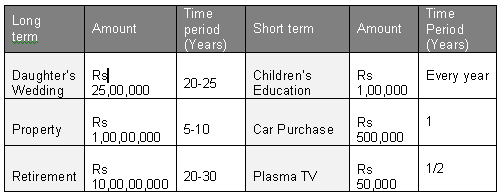Photographs: Rediff Archives Dhanashri Rane, Fundsupermart.com
Most of us think about investments when we have to submit income tax related documents to our human resources department every year. Actually, a good amount of compulsory saving does happen due to tax planning. Several countries including India offer tax incentives to promote savings and channelise investments.
For example, health insurance premium up to Rs 15,000 under section 80D, for parents (Rs 20,000 for senior citizens) or infrastructure bonds worth Rs 20,000 get tax exemption.
However, instead of last minute investments, you should preferably look at investing in products suitable for the short-term and long-term horizon and thereby, create a financial plan for your family and self.
Disclaimer: This article is for information purpose only. This article and information do not constitute a distribution, an endorsement, an investment advice, an offer to buy or sell or the solicitation of an offer to buy or sell any securities/schemes or any other financial products /investment products mentioned in this article or an attempt to influence the opinion or behavior of the investors /recipients.
Any use of the information /any investment and investment related decisions of the investors/recipients are at their sole discretion and risk. Any advice herein is made on a general basis and does not take into account the specific investment objectives of the specific person or group of persons. Opinions expressed herein are subject to change without notice.

Penny wise, pound wiser
Every month, you have certain standard expenses such as our utility bills, tuition fees of children, household expenditure, etc.
Though rising food prices in the past months must have left your food bill at an all-time high, you can still approximately calculate savings each month.
This magic number can be used as a basis to arrive at a ballpark monthly investment amount.
In a brief illustration below, we have assumed certain short and long term goals of an individual based in Mumbai (with current inflation, no wonder the retirement corpus is a mind boggling number!).
The template encompasses the amount that needs to be accumulated after a certain time period.

Penny wise, pound foolish
A goal sheet such as this acts as ready-reckoner on how far you are from meeting your short-term and long-term demands. With this understanding, you can evaluate and select the products to accumulate the desired sum.
Suppose, we have certain obligations or goals to be fulfilled within a year or so, one cannot be investing in insurance or equity because these products are meant for long term (at least five years). In that case, the most likely alternative then becomes the savings account which generates 3.5% annualised returns.
For investors with a time horizon of 3 to 6 months, ultra short-term funds can be a much better alternative. Read on for more...Ultra short-term fund v/s savings account
Ultra short-term funds belong to the fixed income category of mutual funds whereas, a savings account is the operating account that you hold with your bank.
In a ultra short term fund, the returns are generated by the fund manager by primarily investing in a portfolio of short-term debt and money market instruments, that is, certificate of deposits issued by banks, commercial papers issued by corporate and treasury bills issued by Government of India, that mature anywhere between 90 to 365 days (as per the fund management strategy).
Clearly, a savings account is a facility offered by banks for you to carry out your day-to-day transactions. On the other hand, the aim of ultra short-term funds as a mutual fund product is to provide reasonable returns in the short term as well as offer liquidity.Key features
Performance
Main advantage of ultra short-term funds over savings account is the return generated. These funds typically give 4.5% to 7% annualised return. So, if one has surplus funds for less than a year, one can easily earn better returns in ultra short-term funds.
Liquidity
One can redeem investment in these funds by submitting a request online or at the fund house/intermediaries' office. Normally, the proceeds are credited in your account in T+1 day.
For example, if you submit the request before 3 pm today, then you may get the redemption amount by the next day.
But, if the request gets registered after 3 pm, you shall receive the money the day after.Tax arbitrage
The dividend income from mutual funds is tax free; albeit the fund house pays a dividend distribution tax (DDT) of 13.84% (in case of non-liquid, debt funds such as ultra short-term funds) before doling out the dividend to investors.
Even with DDT, investors who pay income tax at 20% or more can opt for dividend option and take advantage of tax arbitrage. The difference in the NAV post-dividend declaration will set off capital gains, which would otherwise be taxed at your personal income slab as short-term capital gains.
Minimum investment
Each fund house has a certain minimum amount set for the fund; nonetheless most funds have Rs 5,000 to Rs 10,000 as minimum.Investor checklist
Before investing, check the fund factsheets of ultra short-term funds to review the following:
Examine the credit rating profile of the fund. The rating scale assigned as AAA, P1 or PR+ are supposed to have lowest risk. Better the rating, more stable the fund is.
Average maturity/ duration outline the maturity of fixed income instruments held in the portfolio. Lower the maturity, lower would be the fluctuation in returns.
Mark-to-market (MTM) component in the fund portfolio is also the estimate of variability in returns. Lesser the MTM, lesser the volatility of the fund.Conclusion
In this Information age, we are quite often bombarded with data on investment products and buy/sell recommendations. But, an equally important part of successful financial planning is to make sure our expenses are in check and we save enough to support our present and future needs.
And, we often ignore small cash surpluses on hand, letting them remain in the savings account, or hastily invest them in equity or insurance products, locking them up for a longer term.
This article talks about the need to plan intermediate and short-term financial requirements, and presents ultra short-term funds as an investment option that gives you better returns than your bank account as well as provides liquidity in the short term.








Comment
article